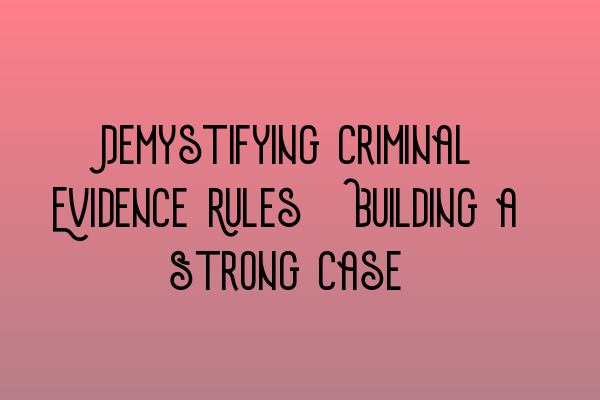Demystifying Criminal Evidence Rules: Building a Strong Case
When it comes to criminal law, one of the most crucial aspects of a successful defense or prosecution is presenting strong and admissible evidence. In order to build a robust case, it is important to understand the rules and guidelines surrounding criminal evidence. This article aims to demystify these rules and provide insights on building a strong case.
The Importance of Admissible Evidence
Admissible evidence plays a critical role in criminal proceedings. It refers to evidence that is legally acceptable in court and can be presented to a judge or jury. The rules of evidence ensure fairness and reliability in the judicial process, protecting the rights of both the accused and the prosecution.
Understanding the concept of admissibility is essential to avoid any pitfalls or issues that could weaken your case. It involves knowing what evidence is permissible and what should be excluded. This knowledge can be the difference between success and failure in a criminal case.
Types of Evidence
Evidence in criminal cases can come in various forms. Some common types of evidence include:
- Direct Evidence: This is evidence that directly proves a fact, such as eyewitness testimony or video footage.
- Circumstantial Evidence: This is evidence that requires inference to draw conclusions, such as fingerprints or DNA analysis.
- Documentary Evidence: This includes written or recorded documents like contracts, police reports, or medical records.
- Expert Evidence: Experts in specific fields can provide their professional opinions on matters related to the case, such as forensic experts.
Evidentiary Rules and Guidelines
There are specific rules and guidelines that govern the admissibility of evidence in criminal cases. These rules vary by jurisdiction, but some general principles apply.
One key rule is the Relevance of the evidence. Evidence must be directly related to the issue at hand and have the potential to prove or disprove a fact relevant to the case.
Another critical rule is the Reliability of the evidence. The court assesses the quality and credibility of the evidence to determine its admissibility. The more reliable and trustworthy the evidence, the higher its chances of being admitted.
Building a Strong Case
To build a strong case, it is essential to carefully gather and present admissible evidence. Every piece of evidence should be scrutinized for relevance, reliability, and authenticity.
Working with experienced criminal law solicitors who understand the intricacies of evidence rules is crucial. They can guide you through the process, ensuring that your case is built on a solid foundation.
Furthermore, preparation is key. Familiarize yourself with the evidence rules and guidelines applicable to your jurisdiction. This knowledge will help you effectively communicate with your legal team and make informed decisions regarding the evidence presented in court.
At SQE Criminal Law & Practice Law UK, we offer comprehensive preparation courses for both the SQE 1 and SQE 2 exams. Our courses cover all the necessary knowledge in criminal law, including evidence rules, to help aspiring solicitors excel in their careers. We also provide useful resources like practice exam questions and mocks, which can be found in our related articles:
- SQE 1 Practice Exam Questions
- SQE 1 Practice Mocks FLK1 FLK2
- SQE 2 Preparation Courses
- SQE 1 Preparation Courses
- SRA SQE Exam Dates
Conclusion
Understanding the rules and guidelines surrounding criminal evidence is crucial for building a strong case. Admissible evidence plays a pivotal role in criminal proceedings, and its proper presentation can greatly impact the outcome of a case. By familiarizing yourself with evidentiary rules, working with experienced solicitors, and utilizing the resources available, you can enhance your chances of success.
Remember, at SQE Criminal Law & Practice Law UK, we are here to support your journey to becoming a skilled criminal law professional. Explore our preparation courses and resources to gain the knowledge and skills you need to excel in your career.
